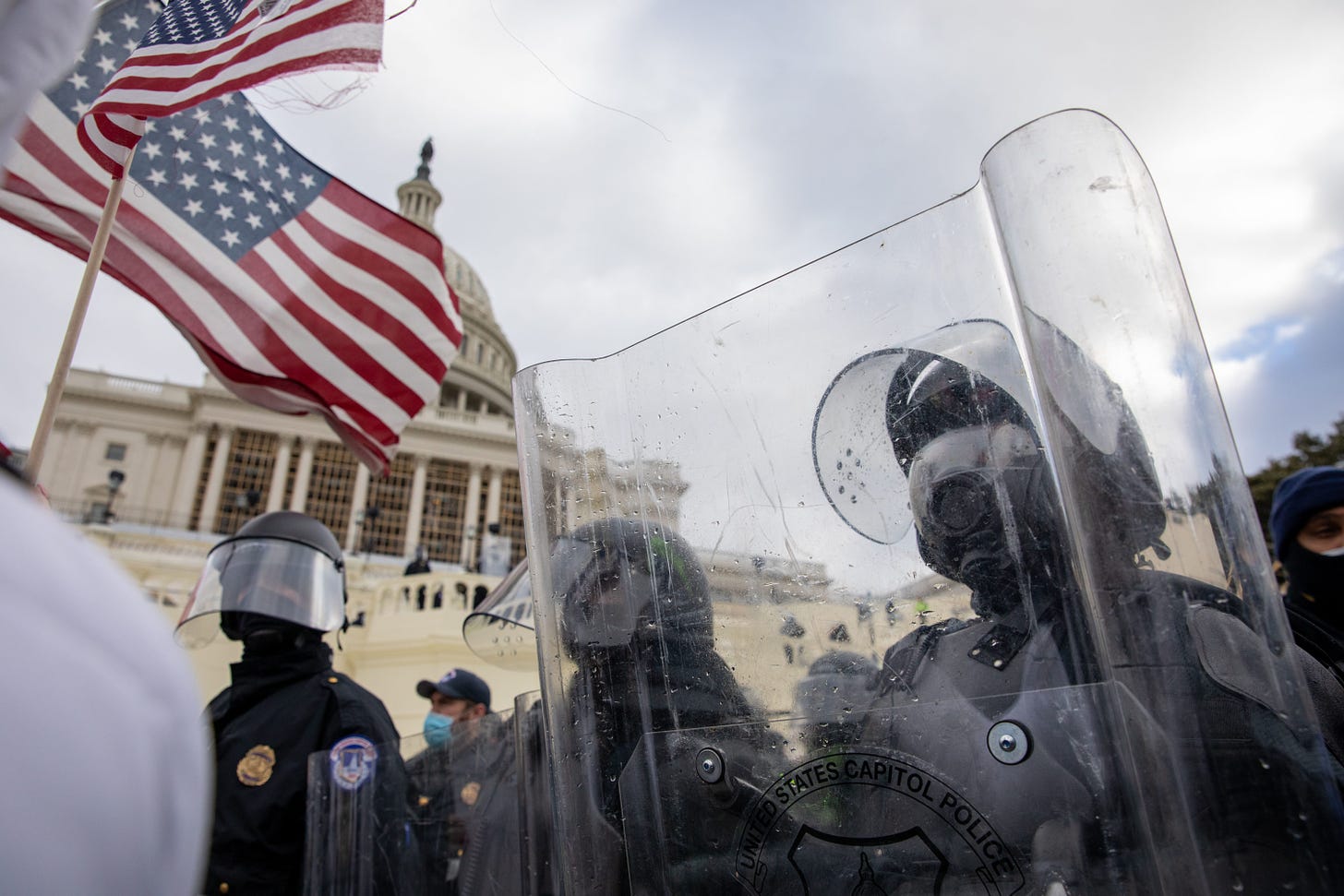Trump Is Gone, But American Democracy Is Still in Danger
Freedom House’s study on American democracy uncovers a disturbing trend far larger than the former president.

The events of January 6 made it bracingly clear that our democracy is in need of repair. An incumbent president attempted to overturn election results, a violent mob assaulted the Capitol as Congress met to formalize his defeat, and lawmakers failed to hold the outgoing leader accountable for his reckless actions, leaving him in place as the de facto chief of his party.
But the problems that have afflicted American institutions over the past four years did not arise suddenly from a healthy political environment. As Freedom House recently concluded, American democracy has been eroding for at least a decade—a trend that is especially remarkable when viewed from a global perspective.
To put the matter in quantitative terms, the United States’s score on the 100-point scale in Freedom House’s Freedom in the World report has dropped from 94 to 83 over the past ten years, the largest decline of any established democracy during that period. The United States has fallen out of a cohort that included traditional peers like France and the United Kingdom, and now finds itself in the ranks of countries with much weaker democratic institutions, such as Panama or Romania.
There is no question that Donald Trump’s time in the White House took a toll on America’s democratic vitality. The former president’s brazen effort to subvert the election was the culmination of four years of decay, in which the administration sought to trample checks on its authority, cast aside safeguards against corruption, and gave succor to right-wing extremists. But to see our country’s democratic decline as primarily a Trump phenomenon would miss the larger picture.
Each year since the 1970s, Freedom in the World has assessed the state of political rights and civil liberties in every country, including the United States. A close examination of data from the past decade offers much to be concerned about, but it strongly suggests that three long-term problems have played a pervasive and outsized role in undermining the health of the American democratic system: unequal treatment for people of color, partisan polarization, and the improper influence of money in politics.
The unequal treatment of people of color, especially black Americans and Native Americans, is one of the most enduring findings in our annual evaluation, and sadly, political equality and equal treatment under the law have deteriorated further in recent years. Although there are parallels with other long-standing democracies, the United States faces a unique challenge in upholding the promise of equality due to its history of slavery and institutionalized segregation. Decades after the Jim Crow era, the fairness and inclusivity of elections is still at issue.
Similarly, the United States suffers from a degree of partisan polarization that surpasses the political divides found in most other established democracies. This bifurcation of the public square prevents efficient democratic functioning and drives our civic discourse to the extremes, where it becomes divorced from the daily concerns of most Americans. Partisan gerrymandering, an inversion of democracy in which politicians effectively choose their voters, is a key driver of this polarization. Analogous but more distorted forms of the practice can be found in countries like Hungary, Jordan, and Malaysia—all rated by Freedom House as only partly free or not free.
Finally, the United States stands out for special-interest influence in politics and policymaking as well as extraordinary levels of campaign spending. In Freedom in the World, the United States ranks lower on the indicator for improper influence on the political process—which includes private interest groups, oligarchs, patronage networks, criminal organizations, armed militants, or foreign powers—than any other large, established democracy, with the exception of Italy.
All of this should alarm citizens. But the U.S. political system is not producing an adequate response to the crisis at hand. Legislative efforts to address pieces of the problem are themselves hampered by partisanship and polarization.
Actors outside the established political system, however, are responding. Existing non-governmental organizations and new groups are mobilizing to protect the vote, uphold basic rights, and strengthen our institutions. This is encouraging, but not enough. While some Americans are rededicating themselves to the experiment in democratic self-government with a passion that has not been seen for decades, many are wary of America’s capacity for self-improvement. The concept of U.S. democracy itself has become politicized in recent years, and elected leaders have forgotten or ignored the many ideals and interests that the vast majority of Americans share.
Democrats, Republicans, and independents alike should be able to unite behind the vision of a free and fair society in which all people are treated equally, everyone has the opportunity to seek a better life, and government serves our collective interests rather than those of certain groups or individuals.
The United States could eventually follow the path of other democracies that have crossed the line into unfreedom and repression, delivering a grievous blow to the cause of human liberty around the world. Or, as it has so many times in the past, it can reinvent itself, and have once again a “new birth of freedom.”









